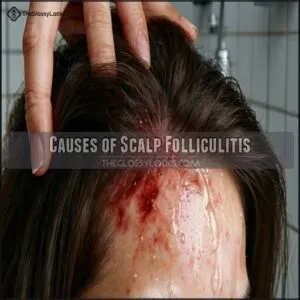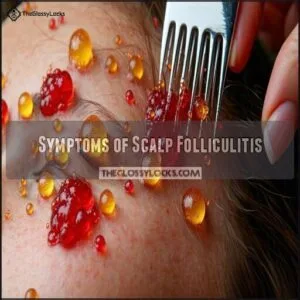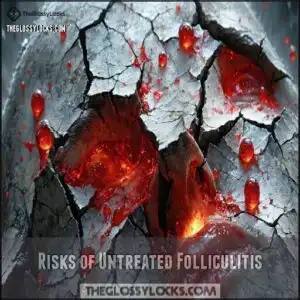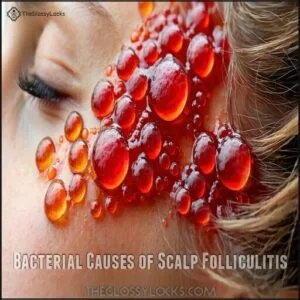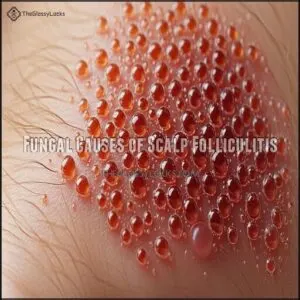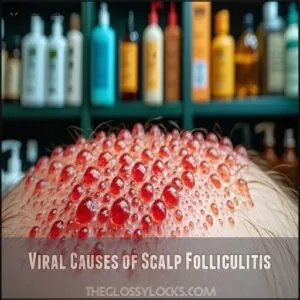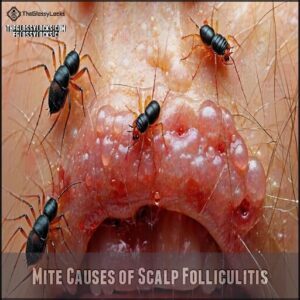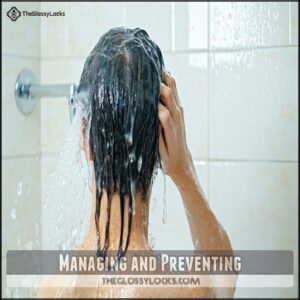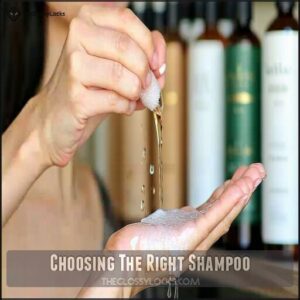This site is supported by our readers. We may earn a commission, at no cost to you, if you purchase through links.

Shampoos like Nizoral, with ketoconazole, fight fungal growth, while salicylic acid-based options gently exfoliate and unclog follicles.
Apple cider vinegar shampoos can help balance scalp pH, reducing irritation.
If dryness is driving you crazy, LivSo’s moisturizing formula can soothe without stripping away natural oils.
For more targeted care, Ovante’s folliculitis shampoo tackles stubborn cases with antibacterial ingredients.
Keep an eye on labels, avoid harsh irritants, and choose a formula suited to both your scalp and hair type.
Sometimes, prevention starts with shampoo.
Table Of Contents
- Key Takeaways
- What is Folliculitis
- Best Shampoos for Folliculitis
- Causes and Triggers
- Managing and Preventing
- Choosing The Right Shampoo
- Frequently Asked Questions (FAQs)
- What is the best shampoo for scalp folliculitis?
- What is the treatment for scalp folliculitis?
- What is folliculitis shampoo?
- Why do dermatologists recommend folliculitis shampoo?
- What should I look for in a folliculitis shampoo?
- What are the best hair products for treating scalp folliculitis?
- How I cured my scalp folliculitis?
- What is the best wash for folliculitis?
- Does folliculitis shampoo work?
- What is the best shampoo for foliculitis?
- Conclusion
Key Takeaways
- Look for shampoos with ingredients like ketoconazole, salicylic acid, or tea tree oil to fight bacteria, fungi, and clogged pores.
- Avoid shampoos with harsh irritants like sulfates or strong fragrances to prevent further scalp irritation.
- Use targeted options like Nizoral for fungal issues or CLn Healthy Scalp Shampoo for bacterial and buildup-related problems.
- Choose a shampoo that matches your scalp’s needs, like LivSo for dry scalps or apple cider vinegar formulas for pH balance.
What is Folliculitis
Folliculitis happens when hair follicles on your scalp get inflamed, often from bacteria, fungus, or clogged pores.
Inflamed hair follicles can leave your scalp itchy, sore, or burning—don’t let bacteria or clogged pores take over!
It can leave you with itchy, red bumps or even pus-filled spots that might make your scalp feel sore or irritated.
Causes of Scalp Folliculitis
Scalp folliculitis happens when hair follicles get inflamed, often leading to red, itchy bumps.
Common culprits include:
- Sweat and Folliculitis: Trapped moisture fosters bacteria.
- Product Buildup: Clogged follicles irritate the scalp.
- Shaving Practices: Nicks invite infections.
- Helmet Use: Prolonged wear traps sweat.
- Immune System: Weak defenses heighten scalp infection risks.
Stay mindful and proactive!
Symptoms of Scalp Folliculitis
Red bumps, itch intensity, and pus discharge are telltale signs of folliculitis.
You might notice tiny inflamed pustules that hurt when touched, along with scalp pain or burning.
It doesn’t stop there—untreated scalp folliculitis can make brushing your hair feel torturous.
| Symptom | Description |
|---|---|
| Initial Bumps | Red, tiny, and inflamed |
| Itch Intensity | Varies, sometimes unbearable |
| Pus Discharge | Yellow or white fluid |
| Scalp Pain | Tenderness or burning |
| Hair Loss | Severe cases, scarring risk |
The symptoms of folliculitis can be quite debilitating, affecting daily activities such as brushing hair.
Risks of Untreated Folliculitis
Ignoring folliculitis might seem harmless at first, but it can snowball into serious problems.
Don’t overlook folliculitis—it can quickly escalate, causing scars, hair loss, and deeper infections if left untreated. Stay proactive!
Untreated scalp folliculitis could lead to:
- Scarring that makes smooth, healthy skin a distant memory.
- Permanent hair loss, leaving behind thinning patches or bald spots.
- Infections spreading deeper, sparking conditions like cellulitis or chronic scalp inflammation.
Don’t shrug off those itchy bumps.
Scalp tenderness overview can help identify the root cause.
Early folliculitis treatment isn’t just about appearance—it prevents complications, protects your scalp, and keeps infections from evolving into stubborn, systemic issues.
Best Shampoos for Folliculitis
Finding the right shampoo for folliculitis can make a world of difference in calming your scalp and preventing flare-ups.
These dermatologist-recommended options are packed with ingredients that target the root causes, from bacteria to buildup.
1. Nizoral Anti Dandruff Shampoo 1 Ketoconazole
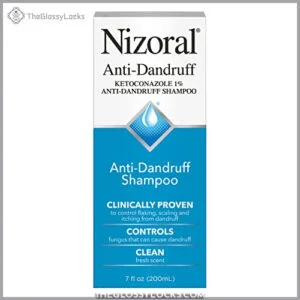
In the case of tackling folliculitis, Nizoral Anti-Dandruff Shampoo is, hands down, a superstar. Packed with the active ingredient Ketoconazole 1%, it’s like the secret agent against scalp fungus, cutting straight to the root of the problem.
Plus, it’s gentle on all hair types—whether you’ve got color-treated strands, gray hairs, or somewhere in between. What sets Nizoral apart is its clinically-proven ability to control flaking, scaling, and itching caused by dandruff while fighting the underlying fungus.
It’s simple to use too—massage it in, wait a few minutes, rinse, and done! Dandruff shampoos often contain zinc pyrithione as well to help reduce scalp irritation.
With just two uses a week, its fresh scent and long-lasting relief keep your scalp happy. Give it a try—it’s an easy step toward healthier, more comfortable hair days.
Best For: Those dealing with dandruff, flaking, or itchy scalp, looking for a powerful, clinically-proven solution.
- Contains Ketoconazole 1%, effective against scalp fungus.
- Safe for color-treated, chemically processed, and gray hair.
- Requires only two uses per week for long-lasting relief.
- Not suitable for those seeking daily dandruff shampoo.
- May be pricier than regular anti-dandruff shampoos.
- Scent preference may not suit everyone.
2. Clarifying Scalp Shampoo Salicylic Acid
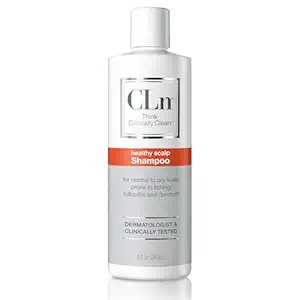
If you’re ready to tackle folliculitis head-on, a clarifying shampoo with salicylic acid might just be your new best friend.
Designed by physicians, it’s a scalp savior known for deeply cleansing and exfoliating clogged hair follicles.
Packed with salicylic acid and sodium hypochlorite, this shampoo reduces oil, removes buildup, and fights bacteria – giving your scalp the reset it craves.
You’ll also appreciate its hypoallergenic formula, free of parabens, dyes, and fragrances, making it gentle yet effective.
It’s safe for chemically treated hair and even doubles as a beard treatment.
Consistency is key: use this powerhouse 1-3 times a week.
While its lather is minimal and the scent is a little strong, countless users swear by its ability to combat folliculitis and restore scalp health.
Best For: Individuals with scalp conditions like folliculitis, dandruff, or excessive oil who need a gentle yet effective clarifying shampoo.
- Expensive, with a small bottle size leading to frequent repurchases.
- Strong chemical odor that may linger on hair and bedding despite being labeled "fragrance-free."
- Poor lathering, requiring a larger amount of product for effective use.
- Clinically proven to reduce symptoms of folliculitis and soothe irritated scalps.
- Hypoallergenic, free from parabens, dyes, and fragrances, making it suitable for sensitive skin.
- Works as both a scalp and beard treatment, offering versatility in usage.
3. Vegan Apple Cider Vinegar Shampoo
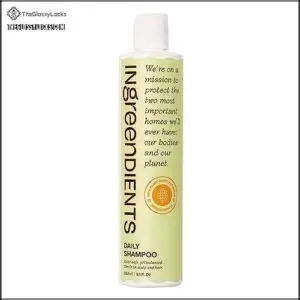
Treat your scalp to the gentle yet effective power of vegan apple cider vinegar shampoo, a natural multitasker that tackles folliculitis with ease.
This 100% plant-derived formula combines the antimicrobial strength of apple cider vinegar with the soothing benefits of tea tree oil, creating a winning duo for sensitive, irritated scalps.
What sets this shampoo apart? It bans over 1,400 questionable ingredients, including harsh sulfates and betaine, making it perfect for those with extra-sensitive skin.
Whether your hair is color-treated, keratin-treated, or natural, this shampoo has you covered.
As a bonus, it comes in recycled packaging, so it’s as eco-friendly as it’s effective.
Its mild fragrance feels invigorating without being overpowering. A healthier, balanced scalp is just a wash away!
Best For: Individuals with sensitive scalps, folliculitis, or color/keratin-treated hair seeking a gentle, eco-friendly shampoo.
- Made with 100% plant-derived ingredients, free from harsh chemicals.
- Bans over 1,400 questionable ingredients, sulfate-free and betaine-free.
- Antimicrobial and soothing properties from apple cider vinegar and tea tree oil.
- May not lather as much as traditional shampoos due to lack of sulfates.
- Scent may not suit those who prefer fragrance-free products.
- Could be more expensive than conventional shampoos.
4. Ovante Folliculitis Scalp Shampoo
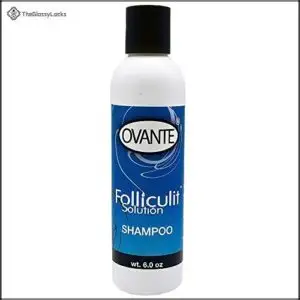
Ovante Folliculitis Scalp Shampoo is a lifesaver for irritated scalps.
Packed with tea tree and lemongrass oils, it tackles bacteria and fungi while soothing redness and itching.
Its gentle formula cleanses clogged follicles, helping prevent hair loss and promoting scalp health.
A quick 3-5 minute application restores balance and provides noticeable relief for persistent folliculitis symptoms.
Users rave about its effectiveness, with significant improvement after just a few applications.
Plus, it’s safe, natural, and suitable for various scalp conditions.
Best For: Individuals suffering from scalp folliculitis, dandruff, or irritated scalps looking for a natural, soothing solution.
- Natural formula with tea tree and lemongrass oils for antibacterial and antifungal benefits.
- Effective at reducing symptoms like itching, redness, and flaking after a few uses.
- Suitable for various scalp conditions and promotes healthier hair follicles.
- Results may vary depending on severity of the condition.
- Thinner consistency may require careful application to prevent waste.
- Higher price point compared to other shampoos on the market.
5. LivSo Moisturizing Scalp Shampoo for Dry Hair
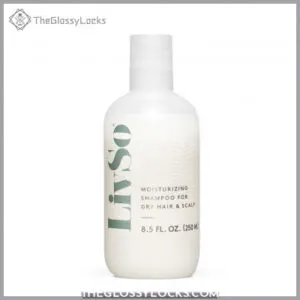
LivSo Moisturizing Scalp Shampoo is perfect if you’ve got a dry, itchy scalp and textured hair.
With soothing glycolic acid, hydrating coconut oil, and calming xylitol, it cleanses gently without stripping your hair’s moisture.
Its sulfate-free formula leaves your scalp comfortable and hair manageable, balancing both care and comfort.
Bonus? It’s great for curly, thick hair types struggling with folliculitis.
Just don’t forget sunscreen—alpha-hydroxy acid can increase sun sensitivity.
LivSo isn’t medical but works wonders for scalp dryness relief.
Best For: Individuals with dry, itchy scalps and textured or curly hair, especially those prone to scalp dryness or irritation.
- Hydrates and soothes scalp with coconut oil, glycolic acid, and xylitol.
- Sulfate-free formula gently cleanses without stripping moisture.
- Suitable for curly, thick hair and reduces scalp itch.
- Not a medical treatment for conditions like severe folliculitis.
- Contains AHA, which increases sensitivity to sunlight.
- Full effectiveness requires using the complete product line.
Causes and Triggers
Folliculitis can flare up when bacteria, fungi, or even mites invade clogged hair follicles. Sweat, tight hats, or shaving mistakes can make you more prone to these frustrating bumps.
Bacterial Causes of Scalp Folliculitis
Bacterial scalp folliculitis often stems from Staphylococcus aureus, leading to red, tender bumps.
Poor hygiene, heavy hair products, or shared tools can disrupt your scalp microbiome, increasing the risk of bacterial transmission. Weak immunity also plays a role.
To protect against bacterial infections and avoid antibiotic resistance, consider these hygiene practices and use an antibacterial shampoo formulated for effective folliculitis treatment.
- Wash regularly.
- Avoid sharing brushes.
- Clean pillowcases weekly.
- Use lightweight products.
Fungal Causes of Scalp Folliculitis
Fungal folliculitis, often caused by yeast overgrowth like Malassezia, disrupts your scalp microbiome and triggers irritation.
This condition, also known as Pityrosporum folliculitis, leads to red, itchy bumps.
Antifungal treatments, such as ketoconazole shampoo, are highly effective at managing fungal infections.
Using an antifungal shampoo regularly can restore scalp health and prevent flare-ups.
If symptoms persist, consult a dermatologist for personalized solutions to stay proactive and fungus-free.
Viral Causes of Scalp Folliculitis
Viral scalp folliculitis can sneak up via herpes folliculitis, varicella-zoster, or molluscum contagiosum.
These infections often trigger painful, inflamed bumps.
- Herpes folliculitis: Painful blisters caused by herpes simplex.
- Varicella-zoster: Shingles-induced folliculitis.
- Viral transmission: Infection spreads through touch.
- Antiviral treatments: Helps manage outbreaks effectively.
Pairing antiviral meds with a suitable folliculitis shampoo improves healing and minimizes discomfort.
Stress can also exacerbate such conditions.
Stay proactive!
Mite Causes of Scalp Folliculitis
If tiny, unseen intruders like Demodex mites disrupt your scalp’s microbiome, it can ignite folliculitis and unbearable itching.
These mites are surprisingly common and tied to immune responses.
Treatments vary:
| Treatment | Effectiveness |
|---|---|
| Permethrin | High |
| Ivermectin | Medium |
| Antifungal Shampoo | Low |
| Tea Tree Oil | Mild |
Use shampoos with tea tree oil to soothe irritation and restore balance.
Managing and Preventing
Managing folliculitis starts with using the right shampoo and making simple changes to your daily habits.
By keeping your scalp clean and avoiding common irritants, you can reduce flare-ups and keep your hair follicles healthy.
Home Remedies for Scalp Folliculitis
Got scalp folliculitis? You’re not alone, and a few practical natural remedies can help.
Start with a DIY scalp rinse using apple cider vinegar to balance your scalp’s pH and reduce buildup. Add natural antifungal oils like tea tree oil shampoo to your haircare routine for its soothing properties.
Need quick relief? Try a warm, herbal compress therapy to calm irritation. Don’t forget a simple scalp massage—it increases circulation and supports healing.
Explore options for tea tree products for ideal scalp health. Combine these with your folliculitis shampoo for the best results.
Lifestyle Changes to Prevent Scalp Folliculitis
If you want to avoid folliculitis, a few tweaks to your routine can help.
Stick to proper scalp hygiene, wash gently, and never share hair tools.
Dietary adjustments, like adding omega-3s and greens, can strengthen your scalp.
Stress reduction through yoga can work wonders too.
Loose hairstyles and choosing breathable clothing reduce follicle irritation, making a big difference!
When to Consult a Doctor for Scalp Folliculitis
If your scalp shows persistent symptoms or a worsening condition, like spreading infection or severe pain, it’s time to visit a dermatologist.
Watch for these signs:
- Pus-filled bumps or discharge
- Recurring folliculitis outbreaks
- Intense scalp inflammation
- Difficulty identifying the issue
- Bacterial infection symptoms
Don’t wait—it’s better to address recurring folliculitis early to prevent long-term damage or scarring.
Choosing The Right Shampoo
Choosing the right shampoo for folliculitis is essential to keeping your scalp healthy and comfortable.
You’ll want a formula that suits your hair type while targeting the root causes of irritation and buildup.
Considering Your Hair and Scalp Type
Your hair and scalp have their quirks, so think about your specific needs.
Got an oily scalp, dry hair, or a sensitive scalp? Choose a shampoo for scalp health that suits you best.
For sensitive scalps, look for a gentle folliculitis shampoo. If your hair’s thick or color-treated, pick one that balances care without stripping moisture.
Keep that itchy scalp at bay! Selecting shampoos with dandruff-fighting actives can also provide relief.
Essential Ingredients for Folliculitis Shampoo
Choosing the best folliculitis shampoo means paying attention to ingredients that fight infection and soothe your scalp.
Look for formulas packed with antifungal agents, antibacterial components, and compounds offering hydration and pH balance.
- Salicylic acid: Exfoliates and unclogs hair follicles.
- Tea tree oil: Natural antifungal and anti-inflammatory power. Consider using specialized tea tree shampoos for enhanced benefits.
- Pyrithione zinc: Reduces inflammation while combating bacteria and fungi.
Avoiding Irritants in Folliculitis Shampoo
A sensitive scalp deserves patience and care. Look for sulfate-free shampoos with gentle cleansing agents as sulfate alternatives to avoid irritation.
Fragrance sensitivity? Stick to mildly scented or fragrance-free options. Check for dye concerns and ingredients that maintain your scalp’s pH balance.
Allergen identification is key—skip harsh chemicals, and choose a folliculitis shampoo that soothes inflammation while keeping flare-ups at bay, ensuring gentle cleansing.
Frequently Asked Questions (FAQs)
What is the best shampoo for scalp folliculitis?
For pesky scalp bumps, try CLn Healthy Scalp Shampoo.
It’s packed with salicylic acid and sodium hypochlorite to clear up folliculitis fast.
Bonus: it’s gentle, dermatologist-recommended, and keeps itchiness and irritation at bay!
What is the treatment for scalp folliculitis?
Imagine scratching an itch only to spread the problem—scalp folliculitis needs gentle care.
Treat it with medicated shampoos like salicylic acid-based or antifungal options, warm compresses, and, for stubborn cases, a dermatologist’s prescription to address the issue effectively with medicated shampoos.
What is folliculitis shampoo?
Folliculitis shampoo is specially formulated to treat scalp inflammation caused by clogged or infected hair follicles.
It often contains ingredients like ketoconazole, tea tree oil, or salicylic acid to combat infections, itching, and buildup.
Why do dermatologists recommend folliculitis shampoo?
Over 80% of folliculitis cases stem from bacterial or fungal infections.
Dermatologists recommend shampoos with antifungal or antibacterial ingredients to reduce inflammation, prevent recurrence, and soothe your scalp.
Because no one should lose confidence over itchy bumps!
What should I look for in a folliculitis shampoo?
Look for ingredients like tea tree oil, salicylic acid, or ketoconazole to fight bacteria or fungi, and avoid harsh chemicals.
Choose sulfate-free formulas that soothe irritation while gently cleansing clogged hair follicles.
What are the best hair products for treating scalp folliculitis?
Choose shampoos with ingredients like salicylic acid, tea tree oil, or ketoconazole to fight infections and soothe inflammation.
Options like CLn Healthy Scalp or Nizoral work wonders, keeping your scalp calm and irritation-free.
How I cured my scalp folliculitis?
Kicking scalp troubles to the curb, I took charge with CLn Healthy Scalp Shampoo, warm compresses, and ditching heavy hair products.
Patience, persistence, and a scalp-friendly routine turned frustration into relief.
You’ve got this!
What is the best wash for folliculitis?
A gentle, medicated wash, like CLn Healthy Scalp Shampoo, works wonders for folliculitis.
Packed with sodium hypochlorite and salicylic acid, it reduces bacteria, clears clogged follicles, and soothes irritation without drying out your scalp.
Does folliculitis shampoo work?
Folliculitis shampoos can work if you’ve got the right ingredients like salicylic acid, ketoconazole, or tea tree oil.
They help reduce inflammation, kill bacteria or fungus, and prevent clogged follicles, keeping your scalp healthier with key ingredients.
What is the best shampoo for foliculitis?
If you’re battling folliculitis, try CLn Healthy Scalp Shampoo.
It’s packed with salicylic acid and sodium hypochlorite to fight bacteria, reduce inflammation, and soothe irritation.
For a budget-friendly option, go with Nizoral’s ketoconazole formula.
Conclusion
What’s the secret to finding the best shampoo for folliculitis? It’s all about addressing the root cause.
Whether you’re battling fungus with Nizoral, exfoliating clogged pores with salicylic acid, or soothing dryness with LivSo’s moisturizing formula, there’s an option for every need.
Remember to check labels, avoid harsh irritants, and choose a shampoo that fits your scalp and hair type.
Treat folliculitis early, and you’ll keep your scalp healthier, happier, and free from irritation!

